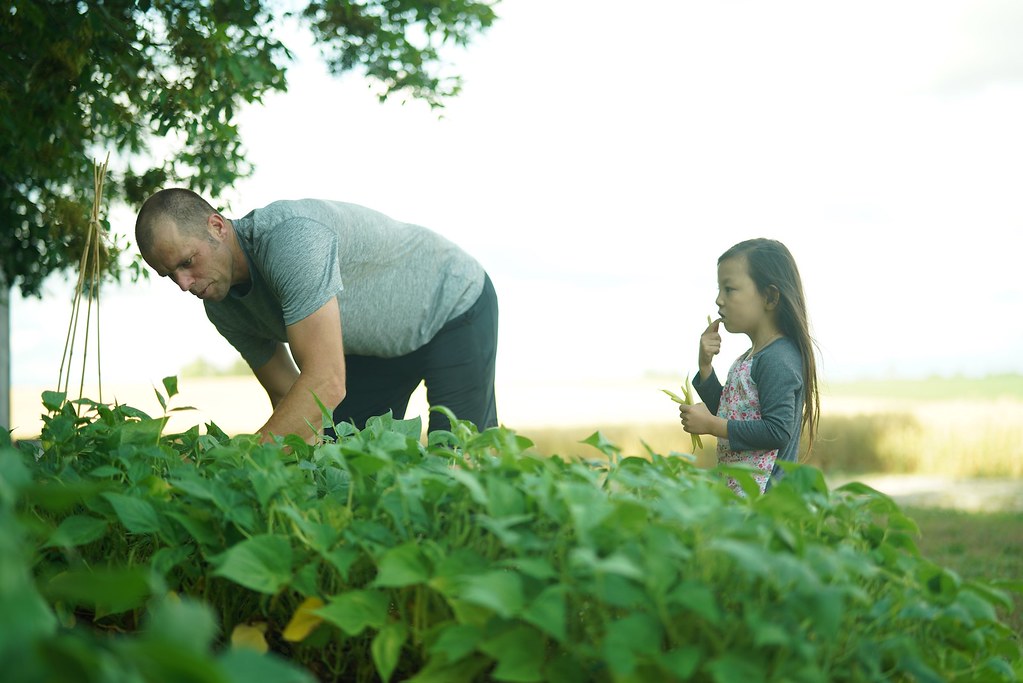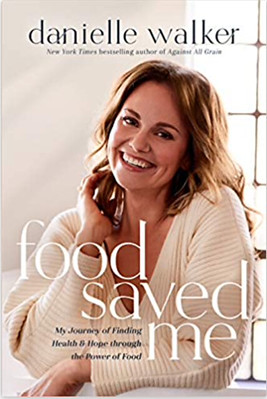After being diagnosed with an autoimmune disease at age 22 and suffering for many years, Danielle Walker found health through dietary and lifestyle changes. Inspired by her own health journey, Danielle has a passion for helping others learn how food can change their lives. She shares her gluten-free recipes on her blog as a beacon of hope. It’s a grace to welcome Danielle to the farm’s front porch today…
In 2008, my husband, Ryan, and I flew to a remote village in Uganda as part of a fifteen-day humanitarian trip sponsored by my company.
I had been suffering from debilitating stomach issues for months with no viable solutions and no relief in sight.
Ryan and I spent our first night in Uganda with me locked away in our hotel bathroom in excruciating pain.
That left us only one option: a small Ugandan hospital located roughly three miles from our hotel.
“I was in a strange hospital in a developing country, and I had just been told I had an autoimmune disease.”
After a fifteen-minute drive, we stopped in front of a single-story, dingy-white dilapidated building that looked as if it hadn’t seen paint or a hammer in decades. An old van that had been made into an ambulance sat in front with the words The Surgery painted on it in royal blue.
The beds were wooden planks with paper-thin mats placed on top—no box springs or mattresses—and bugs were crawling everywhere. Maybe we should go . . . , I thought to myself. But before I could express my concerns to Ryan, a tall, distinguished-looking, gray-haired man appeared in the doorway.
“Mrs. Walker?” he said, smiling. “I’m Dr. Stark.” He had a British accent that I found strangely comforting. “I’m afraid you are severely anemic and dehydrated.” That was less comforting.
He paused and looked at me with compassion in his eyes. “I have never seen such high levels of inflammation coupled with such acute anemia and dehydration. Nor have I ever seen this severe a case of an autoimmune disease.”
His words swirled around my mind as I tried to take it all in.
I was in a strange hospital in a developing country, and I had just been told I had an autoimmune disease—a term no other doctor had used to describe my condition before.










I wasn’t even sure what that meant, but paired with critical condition, it didn’t take much of a leap to figure out it wasn’t good.
“I wasn’t even sure what that meant, but paired with critical condition, it didn’t take much of a leap to figure out it wasn’t good.”
“I’m sorry,” my dad broke in. “What exactly does all of that mean?”
“You’re eating, but your gut isn’t able to absorb the nutrients your body needs. It’s all seeping out. That is one of the challenges of your particular autoimmune disease. In Uganda, where we tragically experience a multitude of other ailments and diseases, we rarely if ever see autoimmune diseases.”
“Why is that?” Ryan asked.
“Perhaps it’s because this country isn’t overly sterile, like the US and other westernized nations,” he suggested.
“The children here grow up with the understanding that God made dirt, and dirt doesn’t hurt. They play in it. They eat from it. They likely have parasites, but they aren’t given antibiotics from birth for a simple ear infection, for instance. They aren’t usually born by cesarean, which increases the risk of autoimmune conditions and allergies from the start due to the antibiotics administered to the mother and the lack of beneficial flora passed to the infant during a vaginal birth.”
I thought about the hand sanitizers and bleach wipes I’d been instructed to bring with me and had already used dozens of times since boarding the first flight in San Francisco.
We’d been lectured before we left the States to wash our hands frequently and not drink the water or eat any raw food because the parasites would make us sick.
Along with our vaccinations, we’d even been given a ready-to-pop Z-Pak in case any of that happened. This antibiotic, azithromycin, would completely wipe out the bacteria—both good and bad—just as the ones I’d been administered before my colonoscopy had.
“Everything in the US is bleached and overly cleaned,” he continued. “As soon as your kids drop something on the floor, you’re wiping it down with sterilized towelettes. You have an overly sanitized nation, and as a result, many of you have an overgrowth of unhealthy bacteria and an underrepresentation of healthy bacteria in your gut.”
He looked at me. “And in some cases, that can lead to autoimmune diseases like Crohn’s disease, UC, rheumatoid arthritis, and a host of others. The people here eat their food fresh from the ground. Most don’t wash their hands before eating, and they don’t always use silverware. They eat the things they have grown without washing them, so their food has natural microorganisms on it. They’re not bleaching it or spraying it with something to kill all the bacteria.”
“If nobody here has this disease because of the way they eat and prepare their food,” I said, clutching my still-churning stomach, “then why don’t we do it that way at home?”
He explained that in America, we tend to go for immediate gratification—whatever’s quickest and most convenient. That means the food we are growing is often altered to grow faster. By using genetically-modified (GMO) seeds, pesticides, and insecticides, growers also produce crops that are less susceptible to damage.
Not only has much of our food been altered from the way God intended it and the way it used to be grown, but we, as a culture, have moved far from the practices of our grandmothers and great-grandmothers, who cooked from scratch using unprocessed foods.
Half the ingredients listed on the prepackaged items most of us eat today are barely even pronounceable. They aren’t found in nature. We created them to make “real food” look nicer and last longer.
In addition, we wash and bleach fruits and vegetables to the point that virtually none of the natural, healthy bacteria or probiotics from the soil are left on them. To top it off, we pick food early—before it’s fully ripe—so it can be transported to grocery stores, some of which spray the produce with even more chemicals to slow the ripening process.
“I still believed God wanted me to come to Uganda. Now I was starting to wonder if maybe He had brought me here so I could start to learn how to help my body heal itself.”
We’re also one of the only cultures that doesn’t regularly incorporate natural forms of fermented foods like sauerkraut, kimchi, and kefir into our diet—natural probiotics that add beneficial bacteria and enzymes to our intestinal flora, increase the health of our gut and digestive system, and enhance the immune system. The less diverse our gut flora, the higher the risk of chronic inflammatory conditions such as inflammatory bowel disease, Crohn’s, and UC.
Had I not been in so much pain and so utterly exhausted from the travel and lack of sleep, I could have listened to Dr. Stark talk for hours.
After consulting with two GI specialists and undergoing a battery of scans, biopsies, and blood tests in some of the most sophisticated medical facilities in the Bay Area, who would have guessed that the most thorough explanation of what I had and how I might have gotten it would come from a doctor in a dilapidated two-room hospital in the middle of a developing country.
I still believed God wanted me to come to Uganda. Now I was starting to wonder if maybe He had brought me here so I could start to learn how to help my body heal itself.
On a Sunday morning in the hospital, Dr. Stark appeared in the doorway. “I’ve just come from church,” he said. “I felt God impress upon me that I was supposed to come and check on you. And pray for you.”
“Someone greater than everything that was happening was with me, reminding me that He is good, even in times of desperation and hopelessness.”
Wow. I was stunned. We had never discussed our faith with Dr. Stark, so until that moment, I didn’t even know that he believed in God.
“It seems God has you in Uganda for a special reason,” the doctor said.
As Dr. Stark prayed, I realized I had never had a Western-trained doctor do anything like that during any hospital or office visit.
In my experience, faith and medicine were not intertwined.
That morning restored a glimmer of hope in me.
Someone greater than everything that was happening was with me, reminding me that He is good, even in times of desperation and hopelessness.
Maybe I am going to be okay.
Danielle Walker is a 3X New York Times Bestselling author, health advocate, and self-trained chef. For over a decade she has been a pioneer in advocating for a grain- and gluten-free lifestyle, having earned a spot on the coveted Forbes 30 under 30 list in 2015. Her delicious recipes have satiated the palates of autoimmune sufferers, kids with food allergies, healthy eaters, and foodies alike. From nostalgic comfort foods to healthy holiday swaps to quick-and-easy meals for kids, Danielle has created thousands of recipes as well as kitchen, food, and parenting hacks that make life easier and healthier.
In her new book, Food Saved Me, Danielle reveals for the first time the full story of her journey to find life again through the healing power of food. Through her trials, tribulations, and triumphs, you’ll find that no matter what your ailment, there is hope. Hope that you can live a full, happy, healthy life without feeling hungry, excluded or deprived. Discover the truth—food can radically change your life for the better.
[ Our humble thanks to Tyndale for their partnership in today’s devotion ]








